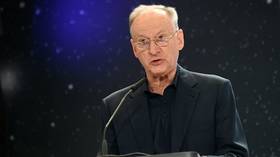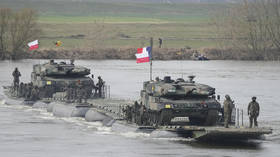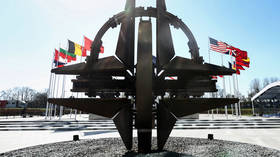NATO ‘de facto’ a party to Ukraine conflict – Moscow

NATO is aiming to retain control over Ukraine and turn it into an “anti-Russian” proxy, the secretary of the Russian Security Council, Nikolay Patrushev, claimed in an interview published on Tuesday.
The US-led military bloc has long been a “de facto” party to the conflict between Kiev and Moscow, as it controls Ukrainian arms supplies and helps to plan attacks on Russia, Patrushev told the Russian newspaper AiF.
Washington and its allies have been actively militarizing Ukraine ever since the 2014 Maidan coup in Kiev, the official said in an interview covering the US-led military bloc, ahead of its 75th anniversary. NATO now seeks to “keep Ukraine or at least a part of it, as a fully controlled anti-Russian territory,” he stated.
NATO collectively decides on the quantity and types of weapons its members provide to Ukrainian troops, the Russian official noted, adding that the range and technical characteristics of those arms are constantly increasing.
The bloc's instructors also “train mercenaries and sabotage units on several nations’ territories to be used in anti-Russian operations,” Patrushev told the paper. Under such circumstances, the Kremlin’s goal of bringing about Ukraine’s “demilitarization” remains a priority, the Security Council secretary said.
Stirring up Russophobia and whipping up the perceived “Russian threat” has also turned into a “major policy” for the West, the official said, arguing that such tactics allow the US and its allies to draw public attention away from internal economic issues.
Anti-Russian hysteria ultimately benefits the US military industrial complex, Patrushev stated.
“The US is gaining profits through… dictating very specific arms purchasing conditions to its allies,” the official told AiF, adding that those arms are then produced by American manufacturers, and such contracts can become economic shackles for other NATO members.
Patrushev’s remarks come amid a historic low in Russia-NATO relations. The situation is now worse than during the Cold War, the head of Moscow’s delegation at the Vienna talks on military security and arms control, Konstantin Gavrilov, acknowledged on Monday.
Gavrilov stated that constant talk from Western politicians about Russia's alleged plans to attack NATO after defeating Ukraine are aimed at diverting public attention from their own governments “pumping … money into the Ukrainian ‘corruption black hole’.”
Moscow has repeatedly stated that it has no plans to engage in a military confrontation with NATO or any of its members. President Vladimir Putin said earlier this year that Russia “has no interest … geopolitically, economically or militarily... in waging war against NATO.”














